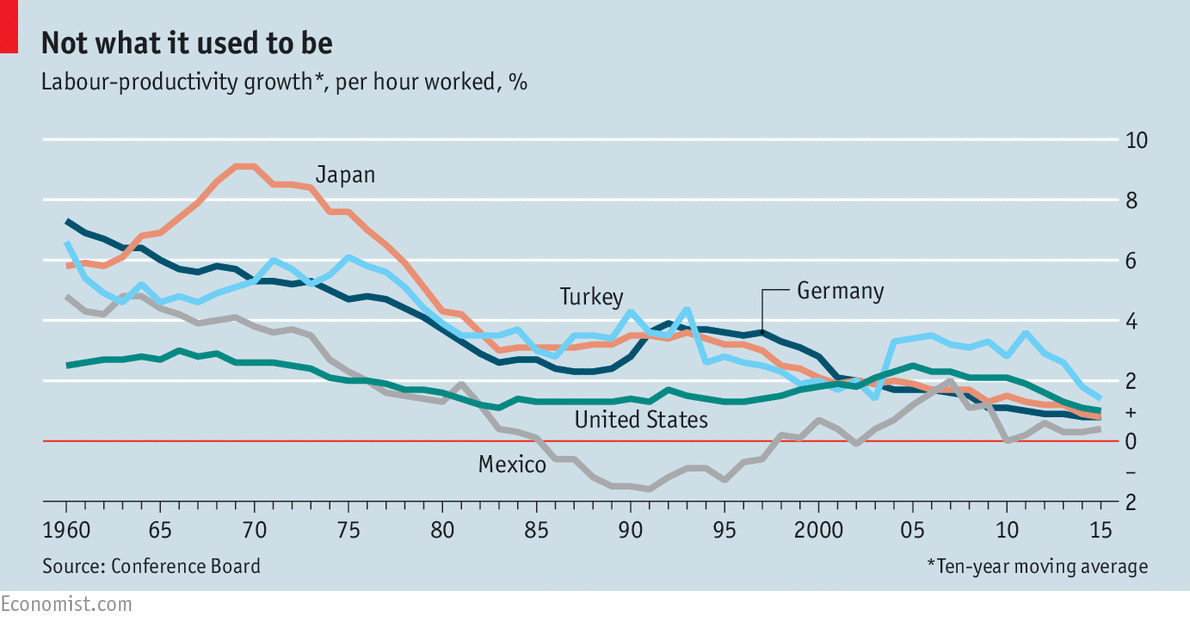Slowing productivity growth
November 2024 › Forums › General discussion › Slowing productivity growth
- This topic has 3 replies, 2 voices, and was last updated 8 years, 7 months ago by
Young Master Smeet.
-
AuthorPosts
-
March 22, 2016 at 2:07 pm #84709
Young Master Smeet
ModeratorThe converse of the ROBOTS!!! discussion:
Quote:Some economists, such as João Paulo Pessoa and John Van Reenen of the London School of Economics, reckon low British wages, which tumbled during the Great Recession, help account for weak productivity growth during the subsequent recovery, since firms felt less pressure to economise. Similarly, abundant, cheap labour may help explain how the American economy has managed to produce the unusual combination of soaring employment and weak wage growth in recent years.http://www.economist.com/node/21695071?fsrc=scn/tw/te/pe/ed/doinglesswithmore
 March 23, 2016 at 7:22 am #118716
March 23, 2016 at 7:22 am #118716ALB
KeymasterI know the financial and economic press are making a big thing about the fall/stagnation of UK "productivity" but I wonder whether what is being measured has the significance they attach to it. But at least it's a recognition that how effectively workers work is important for the operation of the capitalist economy as the more effectively they do the more the profits that can be squeezed out from them. And vice versa: if they are working less effectively then profits are threatened.Nation-wide productivity in the sense that is generally used (as in the table) is measured by dividing (an index of) of output (such as GNP) by (an index) of the number of hours worked by the whole workforce The trouble is that no distinction is made between productive and non-productive hours worked. Civil servants (and many others), for instance, do not produce anything, so it's not a measure of the productivity of productive workers, at least not a direct one, though changes in it will reflect to some extent changes in real productivity.There is another measure: output divided by the number of workers, which gives a differen result. And in the opening line of the article the autho rseems to be offering a third: "valuable stuff per person", but that's the same as output (or income) per head, not generally regarded as a measure of productivity as it includes people who don't work at all (the young, the retired, the unemployed, those unable to work) as well as those in employment.More on how productivity is calculated and how the two ways of calculating it have been moving in the UK can be found here:http://www.ons.gov.uk/employmentandlabourmarket/peopleinwork/labourproductivity/bulletins/labourproductivity/q32015In any event, I wouldn't have thought that the figures for national productivity would influence particular employers in negotiations over the wages of their employees. What would count there would be the productivity of their enterprise or of their whole industry (though of course if national productivity is stagnating they might use this as a pretext for saying no or offering less).
March 24, 2016 at 9:55 am #118717Young Master Smeet
ModeratorIf they are measuring productivity per global hours worked, that does have knock ons for things like benefits and pensions, the pension issue is only significant if the rate of growth of the dependency ratio is higher than the rate of growth of productivity, for example. The chief issue is that social democracy has relied on economic growth and gowing productivity to make welfare capitalis happen, if growth and productivity growth remain schlerotic that means (to borrow an Irish phrase) the Fiscal Space starts to disappear. If small crumbs from a bigger cake aren't available then we have to redistribute the cake.
April 4, 2016 at 3:31 pm #118718Young Master Smeet
ModeratorThis might be related, not necessarily an essential trend, but an interesting one: there has not been an IPO (Initial Public Offering — that is, of shares) in a tech company in the US in q1 2016:http://qz.com/652261/the-market-for-tech-ipos-hasnt-been-this-awful-since-the-great-recession/ Now, there could be multiple causes, but presumably a lack of cash floating around waiting to be invested, plus, possibly a dearth of new business ideas, and also a consolidation of the market whereby Google, Facebook and Amazon hoover up any prospective start-ups.
-
AuthorPosts
- You must be logged in to reply to this topic.
